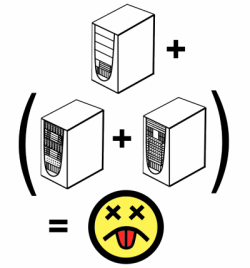What the Ad? - RPG Edition
by in Feature Articles on 2009-01-30Back in the day, when computer graphics ranged between non-existent and lousy and system specs called for RAM amounts usually less than 256k, and floppy disks were still...floppy, games that relied mostly upon the user's imagination provided the biggest bang for their software buck. Instead of the up, down, left, right, B, A, etc., it was all about typing in verbose commands like Look, Take, Get, Kill, and so on. However, where these games lacked in the graphics and gameplay perspective (at least from the modern perspective), there's one thing that they often got right - simulating the mindset of the jerkwad dungeon master.
First, consider the "classic" Zork II. I'm sure that I'll catch hell in the comments, but I absolutely hate this game. Now, I don't have a problem with the storyline or lack of graphics, no, I hate Zork II because it's the type of sadistic game that sets you up to fail. Basically, you could get to one point in the game, unable to proceed because you don't have a certain item...and you can't go back unless you have an old game save. Activision got what they deserved for buying Infocom.


 Dec 08
Dec 08 At my daytime corporate-type job, if I need to even sneeze in the general direction of a production environment, I need both a managerial and customer approvals with documentation solemnly stating that I thoroughly tested my changes and swear on a stack of MSDN licenses and O'Reilly books that I am NOT going to break anything as a result of my changes. Sure, the whole thing is a pain (and admittedly, a necessary evil), but what Bruce W. has to go through beats the pants off of anything I've ever had to go through.
At my daytime corporate-type job, if I need to even sneeze in the general direction of a production environment, I need both a managerial and customer approvals with documentation solemnly stating that I thoroughly tested my changes and swear on a stack of MSDN licenses and O'Reilly books that I am NOT going to break anything as a result of my changes. Sure, the whole thing is a pain (and admittedly, a necessary evil), but what Bruce W. has to go through beats the pants off of anything I've ever had to go through. It was a little past 4AM when Massimo's support pager went off, jarring him awake. Without even looking at the pager or logging into his laptop, he flipped on the television to Channel 242: the Video on Demand channel for the Italian TV broadcaster that he worked for.
It was a little past 4AM when Massimo's support pager went off, jarring him awake. Without even looking at the pager or logging into his laptop, he flipped on the television to Channel 242: the Video on Demand channel for the Italian TV broadcaster that he worked for. Tyson wasn't used to 8:00am meetings, let alone meetings with the not-so-technical-even-though-their-name-implies-it Application Auditors on the dimly lit 32nd floor. Arriving fashionably late at 8:06, he was struck by how many suits were in the meeting with him - and he'd again opted not to shave.
Tyson wasn't used to 8:00am meetings, let alone meetings with the not-so-technical-even-though-their-name-implies-it Application Auditors on the dimly lit 32nd floor. Arriving fashionably late at 8:06, he was struck by how many suits were in the meeting with him - and he'd again opted not to shave. When Glen Sommers was hired to add some features to a Cold Fusion based web application for a non-profit organization, he wasn't surprised by the quality he found, instead he expected it.
When Glen Sommers was hired to add some features to a Cold Fusion based web application for a non-profit organization, he wasn't surprised by the quality he found, instead he expected it.